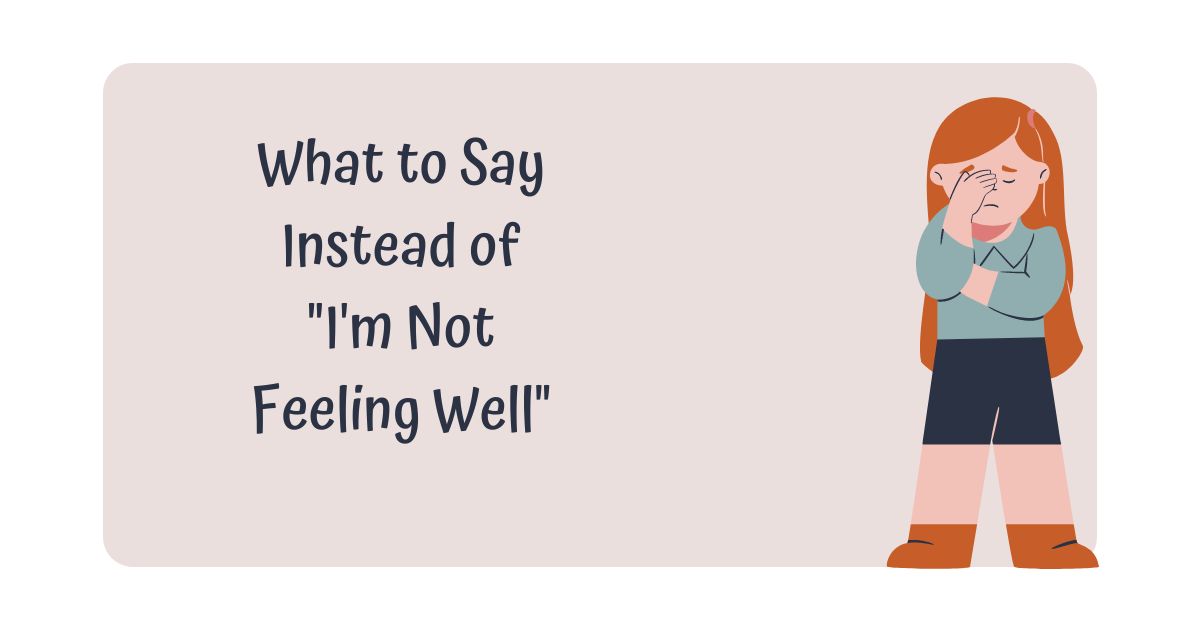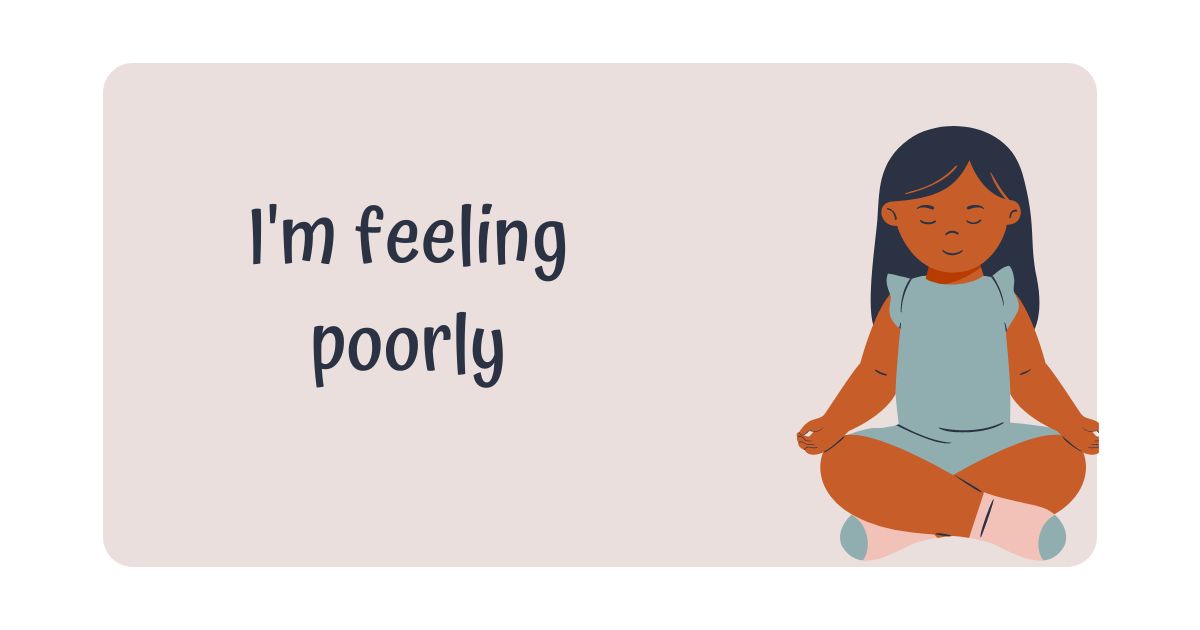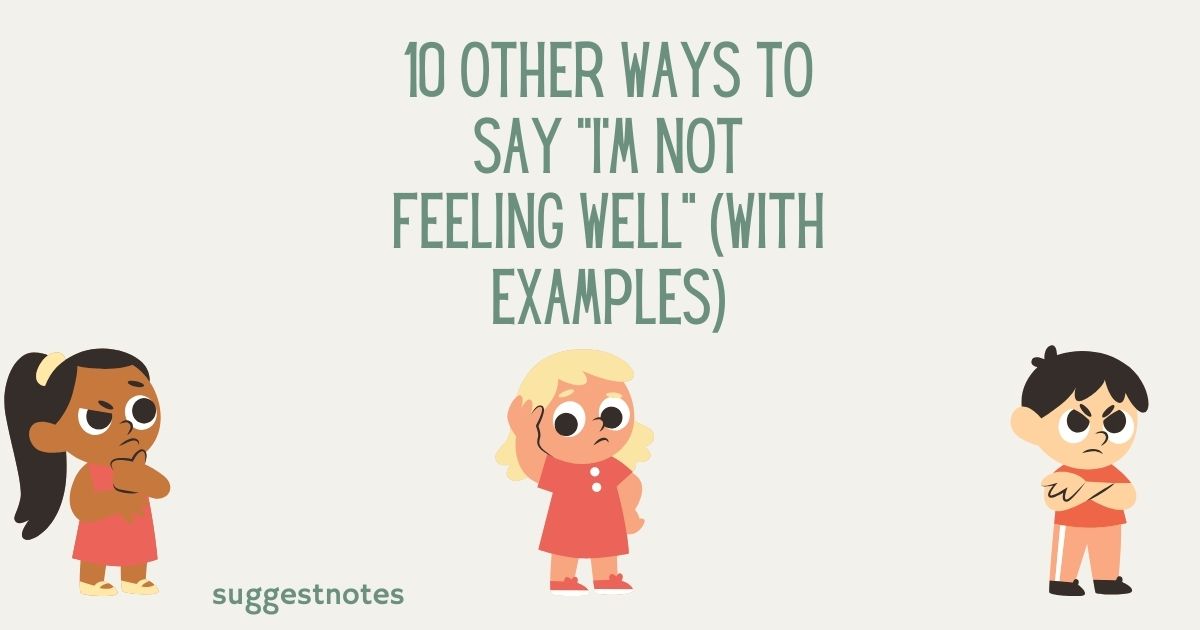Expressing that you’re under the weather can be a delicate task, especially in professional or formal settings. While the phrase “I’m not feeling well” is a straightforward way to convey your condition, it may sometimes come across as too direct or lacking in nuance.
The ability to communicate your health status effectively is crucial in maintaining professional relationships, managing expectations, and ensuring that your needs are understood without causing undue concern or discomfort.
What to Say Instead of “I’m Not Feeling Well”

Here are ten alternative ways to express that I’m not feeling well, each with its own nuances and appropriate contexts:
- I’m under the weather.
- I’m feeling off today.
- I’m not at my best.
- I’m feeling a bit ill.
- I’m not up to par.
- I’m out of sorts.
- I’m feeling poorly.
- I’m sick.
- I’m not myself today.
- I’m a bit rundown.
Let’s delve into each of these expressions, exploring their meanings, appropriate usage, and providing multiple examples to illustrate how they can be effectively employed in various situations.
1. I’m under the weather
Meaning: This common idiom is used to indicate that someone is feeling mildly ill or slightly unwell. It’s a gentle way to express that you’re not feeling your best without specifying the exact nature of your illness.
When to use: This phrase is versatile and can be used in both formal and informal settings. It’s particularly useful when you want to convey that you’re ill without causing alarm or going into details about your symptoms.
Usage examples:
In a professional setting: I’m afraid I won’t be able to attend the client meeting today. I’m feeling a bit under the weather and think it’s best if I rest to recover quickly.
2. I’m feeling off today
Meaning: This phrase suggests a vague sense of not feeling quite right, whether due to minor illness, fatigue, or general discomfort. It implies a temporary state and doesn’t necessarily indicate a serious condition.
When to use: Use this when you’re experiencing mild symptoms or discomfort that affect your usual energy or productivity levels, but you’re still able to function to some degree.
Usage examples:
- In a team meeting: I apologize if I seem a bit distracted. I’m feeling off today, so please bear with me if I need things repeated.
3. I’m not at my best
Meaning: This expression conveys that you’re not performing to your usual standards, potentially due to minor health issues, fatigue, or other factors affecting your well-being. It’s a tactful way to communicate that you might not be as sharp or energetic as usual.
When to use: This phrase is particularly useful in professional or academic settings where performance matters. It acknowledges that you might not be operating at 100% without necessarily attributing it to illness.
Usage examples:
In a work context: I apologise if my presentation wasn’t as polished as usual. I’m not at my best today, but I’m happy to address any questions or clarifications later.
4. I’m feeling a bit ill
Meaning: This straightforward statement directly communicates that you’re experiencing some form of sickness. It’s more explicit than some of the vaguer phrases but still doesn’t specify the nature of the illness.
When to use: Use this when you want to be clear about your health status without going into details. It’s appropriate for both professional and personal situations where a direct approach is appreciated.
Usage examples:
To a supervisor: I hate to do this at the last minute, but I’m feeling a bit ill and don’t think I should come into the office today. I’ll work from home if any urgent matters come up.
5. I’m not up to par
Meaning: Typically used in contexts where performance is measured, this phrase implies that your current state (health, energy, or ability) is not up to your usual standards or expectations. It subtly indicates a temporary decrease in capacity due to illness or fatigue.
This expression is particularly useful in situations where you need to manage expectations about your performance or participation, especially in professional or competitive contexts.
Usage examples:
In a sports context: Coach, I should let you know that I’m not up to par today. I’ll do my best, but you might want to consider giving more playing time to the substitutes.
6. I’m out of sorts
Meaning: This idiom means to be in a state of mild disorder or discomfort, often used to express physical or emotional disturbances without specific details. It suggests a general sense of not feeling right, encompassing both physical and mental states.
Usage examples:
To a colleague: I might need some help with the client calls today. I’m feeling a bit out of sorts and worry I might not be as sharp as usual.
7. I’m feeling poorly

Meaning: A more traditional or old-fashioned way of saying that one feels ill, I’m feeling poorly” conveys a gentle, non-dramatic sense of being unwell. It’s often associated with British English but is understood and used more widely.
Usage examples:
To a grandparent or older relative: I’m afraid I can’t help with the gardening this weekend, Gran. I’ve been feeling poorly and need to rest up.
8. I’m sick
Meaning: This is the most direct and clear way to communicate illness. I’m sick” leaves little room for misinterpretation about one’s health status and can encompass a wide range of illnesses from mild to severe.
Usage examples:
To a supervisor in an urgent situation: I have to be direct – I’m sick and won’t be able to come in for the next few days. I’ll need to arrange coverage for my shifts.
Related Guide:
10 Other Ways to Say “Have a Nice Day” (With Examples)
9. I’m not myself today

Meaning: This phrase implies a deviation from one’s normal state, suggesting illness or emotional distress without going into specifics. It’s a polite way to express that you might not be fully engaged, energetic, or behaving as you typically would.
Usage examples:
In a team meeting: I apologize if I seem distracted. I’m not quite myself today, but I’m doing my best to stay engaged with our discussion.
10. I’m a bit rundown
Meaning: To be rundown” means to be depleted of energy or health, often due to overwork, stress, or lack of rest. This expression suggests a state of physical or mental exhaustion that’s affecting overall well-being.
Usage examples:
To a supervisor: I’ve been putting in a lot of overtime for the project, and I’m feeling a bit rundown. Would it be possible for me to take a day off to recharge?
FAQ’s
What should I do if I’m not feeling well?
If I’m not feeling well, the first step is to rest and monitor your symptoms. Stay hydrated and eat light, nutritious meals. If your symptoms persist or worsen, consult a healthcare professional for advice. If you’re experiencing severe symptoms like difficulty breathing, chest pain, or sudden confusion, seek immediate medical attention.
When should I see a doctor if I’m not feeling well?
You should see a doctor if your symptoms last more than a few days, worsen, or are accompanied by high fever, difficulty breathing, persistent pain, or other concerning symptoms. If you’re unsure, it’s always best to consult a healthcare provider for guidance.
Can I go to work or school if I’m not feeling well?
It’s advisable to stay home if you’re feeling unwell, especially if you have symptoms like fever, coughing, or sneezing, which could spread illness to others. Resting will also help you recover faster. You should return to work or school only when you feel better and after consulting a doctor, if necessary.
What can I do at home to feel better when I’m sick?
Rest is key. Stay hydrated by drinking plenty of fluids like water, herbal teas, or broth. Over-the-counter medications can help alleviate symptoms like fever or congestion. Eating light, nutritious foods and avoiding alcohol or caffeine can also aid your recovery. Humidifiers and saline nasal sprays may help ease congestion.
Is it normal to feel tired even if my other symptoms are mild?
Yes, fatigue is a common symptom when you’re unwell, even if your other symptoms are mild. Your body is using energy to fight off illness, which can leave you feeling more tired than usual. Resting is important to help your body recover.
How can I prevent feeling unwell in the future?
To avoid getting sick, practice good hygiene like washing your hands frequently, especially before eating or touching your face. Stay up to date with vaccinations, eat a balanced diet, exercise regularly, and manage stress. Also, try to avoid close contact with sick individuals and keep your living environment clean.
Conclusion
When I’m not feeling well, it’s important to listen to your body and take care of yourself. Rest, hydration, and proper nutrition can help your body recover faster. Sometimes, a short break from your routine, like taking a nap or sitting quietly, can make a big difference. If symptoms persist, it’s wise to seek medical advice to ensure there’s no underlying issue.
Being unwell reminds us how valuable good health is. It’s essential to be kind to yourself and take the necessary steps toward recovery. By paying attention to your health and knowing when to ask for help, you can get back to feeling your best soon.

As a content writer with five years of experience, I focus on creating insightful and impactful website content that drives engagement and boosts search visibility. With a strong foundation in SEO and digital marketing, I excel at crafting compelling narratives that resonate with audiences and enhance brand storytelling. My passion for data-driven content creation allows me to deliver pieces that not only inform but also inspire action. Whether through blog posts, web copy, or informative articles, I strive to empower businesses to connect authentically with their customers.







